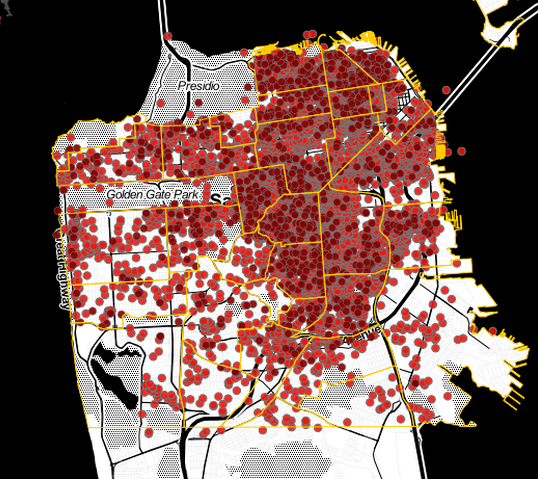New map shows there are short-term rentals in every part of town. How can weak regulation ever control this loss of housing?

By Jennifer Fieber
JANUARY 20, 2015 — On February 1, new short-term rental legislation will kick in. Its purpose is to regulate the Wild West of illegal vacation rentals in San Francisco. In theory, hosts now renting to tenants for fewer than 30 days will register with the city and meet insurance requirements. The law also promises to stop real estate professionals who often have dozens of units on Airbnb for year-round tourist use.
However, the legislation is fundamentally flawed—it contains serious enforcement weaknesses and giant loopholes. Instead of providing a solution to the problems of unregulated, short-term rentals—loss of permanent housing, increased rent expectations, and irritation and safety issues for neighbors—the legislation legalized the practice year-round and left few tools to curb abuse.
The weakness of the legislation is hardly surprising given the inflexibility of the Airbnb lobby. David Chiu, who authored the legislation, was rewarded for his efforts with a $750,000 independent expenditure on his behalf, and now heads to Sacramento while San Franciscans are left with his mess.
The Planning Department will be in charge of enforcement, but the agency has been hamstrung in several ways. Planning staffers must try to determine whether a host is present when a guest is staying (thus not subject to annual limits) or not present (and therefore subject to a 90-day cap). Airbnb refuses to share data about its hosts’ activities, which would greatly facilitate making this determination.
Furthermore, Airbnb does not require its hosts to prove that they have registered with the city before listing. The Planning Department will have to use its own staff and budget to try to sanction unauthorized listings, although it would be easier if hosting platforms refused to list unauthorized listings.
A secondary, yet effective tool of enforcement, the “private right of action,” became surprisingly controversial in the final moments of negotiations. Prior to Chiu’s legislation, housing nonprofits had a “right of action” to bring lawsuits against owners of buildings of four or more units when they violated short-term rental restrictions. Smalltime home sharers spoke vehemently against this in hearings, in testimony that sounded coached, even though in reality they would not have been targets of interest.
Another loophole—one especially grating to some homeowners on the west side of town—sidesteps the residential zoning process. Chiu’s legislation essentially circumvents the nearly 100-year-old zoning code by allowing a commercial business in any house any time, without neighbors having a chance to say whether or not they want rolling suitcases invading their streets. If a host wants to run a Bed and Breakfast business, it does not seem like a huge imposition to request a conditional use permit, as has been done in the past, which allows neighbors to weigh in on the proposal.
So how did we get such poor legislation?
Home sharers and Airbnb dominated the discussion of this legislation. Airbnb benefitted from, and hid behind, a parade of moving testimony from single-family home sharers who actually make up a small percentage of the listings on the site. How could anyone be against a family renting out their daughter’s bedroom every now and then while she is away at college? At the same time, these home sharers voiced vehement opposition to data sharing and the “private right of action” in their testimony. As the saying goes, “If you have nothing to hide…”
In reality, housing advocates like the Tenants Union have little interest in what Mom and Pop hosts do in single-family homes that don’t even qualify for rent control. They are more concerned about rental stock being removed by large-scale operators. Indeed, 30 percent of hosts offer more than one unit on Airbnb, and these hosts generate 46 percent of Airbnb’s revenue, according to some studies. However, these scofflaws were not the ones offering emotional testimony at hearings.
Many San Franciscans have never heard of Airbnb or VRBO and are thus unaware of the extent of the problem and how it affects their neighborhoods. True regulation and enforcement was desperately needed, but the rules were crafted by the industry that they are supposed to regulate and are a far cry from what was needed.
As a result of this legislation’s weakness, the problem is likely to continue and get worse. Already a ballot measure is being crafted by the ShareBetterSF coalition to fix the loopholes and inadequacies of Chiu’s legislation. As we debate and evaluate that ballot measure, it will be important to bear in mind the shortcomings and unfulfilled promises of current short-term rental legislation.
Jennifer Fieber is a founding member of the Anti-Eviction Mapping Project and a researcher for the San Francisco Tenants Union for the past three years.






